Cameron Norrie’s ‘brave’ new plan leads to Australian Open breakthrough
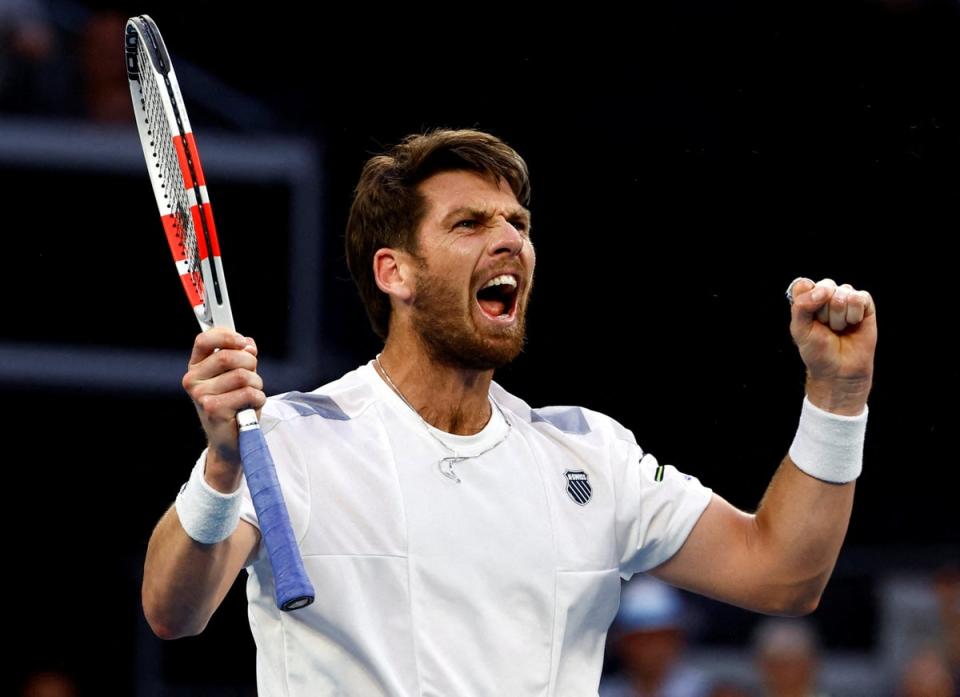
Cameron Norrie entered his third-round match against Casper Ruud at the Australian Open knowing that history was not on his side. The British No 1 had lost all of his three matches against Ruud, the 11th seed and three-time grand slam finalist, while winning just a single set of the eight they had played. In his past five attempts, the British No 1 had been unable to reach the second week of the Australian Open and only just survived in his previous match, against Giulio Zeppieri, after trailing the Italian qualifier by two sets on Thursday.
But while understanding that defeat would have continued his sliding form at the majors, following an underwhelming season last year, Norrie rose to the challenge and produced arguably his most impressive performance at a grand slam in beating Ruud 6-4 6-7 6-4 6-3 in just over three hours. So often a careful, cautious hitter who prefers to stay close to the safety of the baseline in grinding out long, physical wins, Norrie took a drastically different approach and attacked the net relentlessly against the Norwegian to reinvigorate his career at this level.
Given his history, both against Ruud and at the Australian Open, Norrie believed it was a necessary risk: he committed to his plan from the start and was unwavering even as Ruud battled back to win the second-set tiebreak. By the end, the numbers were emphatic: in four sets, Norrie came into the net 56 times, which was more than double the number of approaches from his previous two matches combined. He won 41 of those points and finished with 63 winners in total, serving and volleying confidently to drag Ruud out of position.
“In terms of performances, it was up there with one of my best I think in a grand slam,” Norrie said. “I really had to be brave tonight tactically against Casper. I had to really execute.”
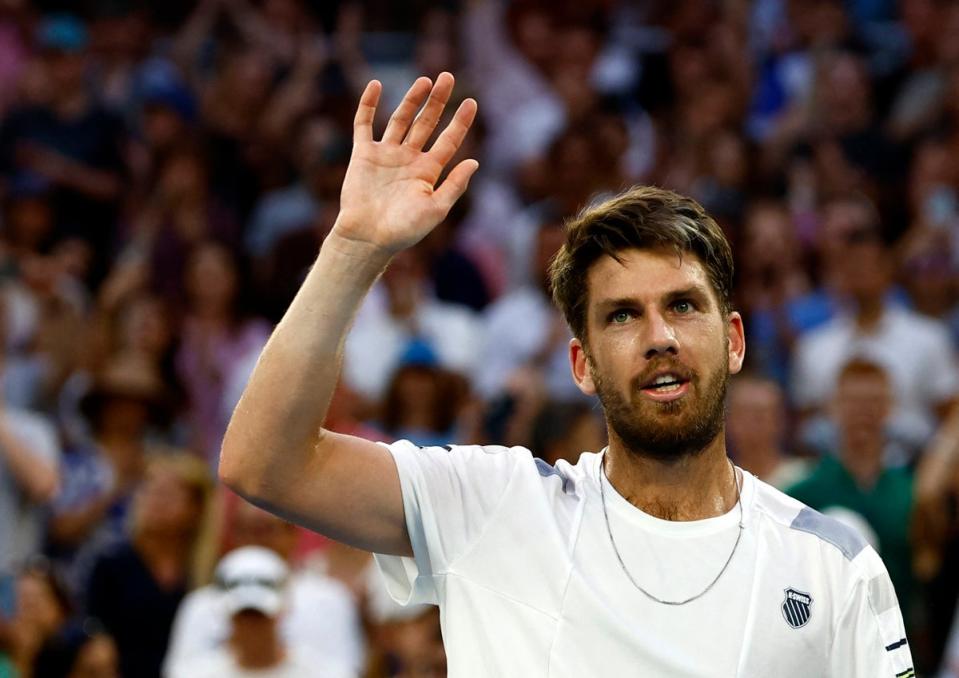
It was an unexpected switch from Norrie, who raised his game and found a variety that had been missing. After reaching the semi-finals of Wimbledon in 2022, his first major breakthrough, Norrie’s results indicated that his level had reached a plateau. As Norrie broke into the top-10 for the first time, he lacked the weapons or explosiveness from the baseline to stay there and in 2023 he failed to make it past the third round at all four of the grand slams. On only one of those occasions, at the French Open, was Norrie beaten by a seeded opponent – and even then it was Lorenzo Musetti, ranked below him in 17th.
Norrie struggled with asserting himself when he was the favourite, as well as when he was the underdog against the best players in the world. At the grand slams, he had lost 10 of his 11 previous meetings with top-20 opponents. Across all events, Norrie had lost eight in a row against top-20 players. His record against Ruud was not an isolated case.
So Norrie made a vow and told himself that their fourth meeting would be different. He took charge behind serve, playing aggressively on his heavy forehand and following his approaches into the net. “I lost to Casper three times already playing the other way and just kind of playing my game, trying to play long points, long points,” he explained. “I really had to take a few more risks today.”
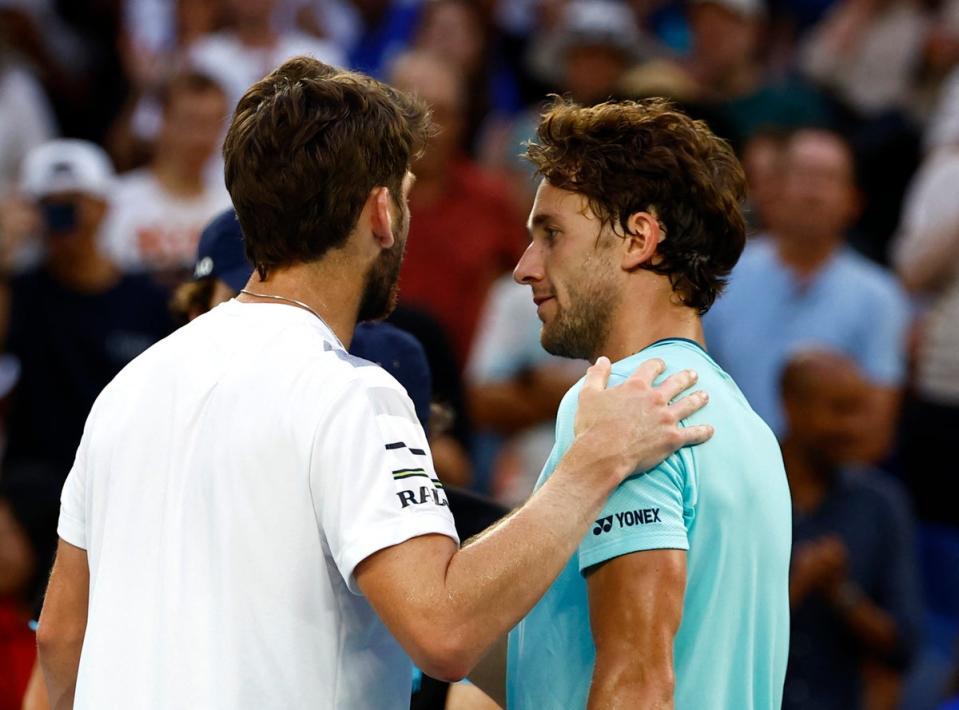
And Norrie enjoyed himself, playing with more positivity than he had managed to find on a tennis court in some time. As he found his game plan was working, Norrie loosened up and played with freedom, which in turn helped his forehand winners flow from the back of the court. After feeling “nervous” in his opening two matches, Norrie can look ahead to the rest of the tournament with confidence.
That will be important given his next opponent is Alexander Zverev; Norrie has lost all four matches he has played against the German and it is the worst individual record he possesses. Though, like with Ruud, Norrie has only ever played in one way against Zverev. There is more than enough evidence to show it is not effective. But now, Norrie has a plan.
Swiatek crashes out as Alcaraz reaches fourth round for first time
By Eleanor Crooks
Teenager Linda Noskova blew the women’s draw wide open by stunning world number one Iga Swiatek in the third round. There are no top-10 seeds left in the top half after 19-year-old Czech Noskova came from a set down to claim a 3-6 6-3 6-4 victory on Rod Laver Arena.
The never-ending production line of Czech female talent is one of the wonders of tennis, and 19-year-old Noskova is at the head of a new generation. Ranked 50 but set to rise rapidly, she showed superb maturity to turn the match around after losing the first set, hitting 10 aces in a tally of 35 winners.
Swiatek speculated that Noskova would feel she had nothing to lose, but the teenager denied that, saying: "I know my game. I know that I have improved a lot in the last year and a half. I just believed my game tonight.
"I just really wanted this win because I didn’t really come to that court with the thought of ‘I have nothing to lose’. I took it very seriously. It was like a match as any other. I just know that, when I’m going to be aggressive, I can play with anyone."
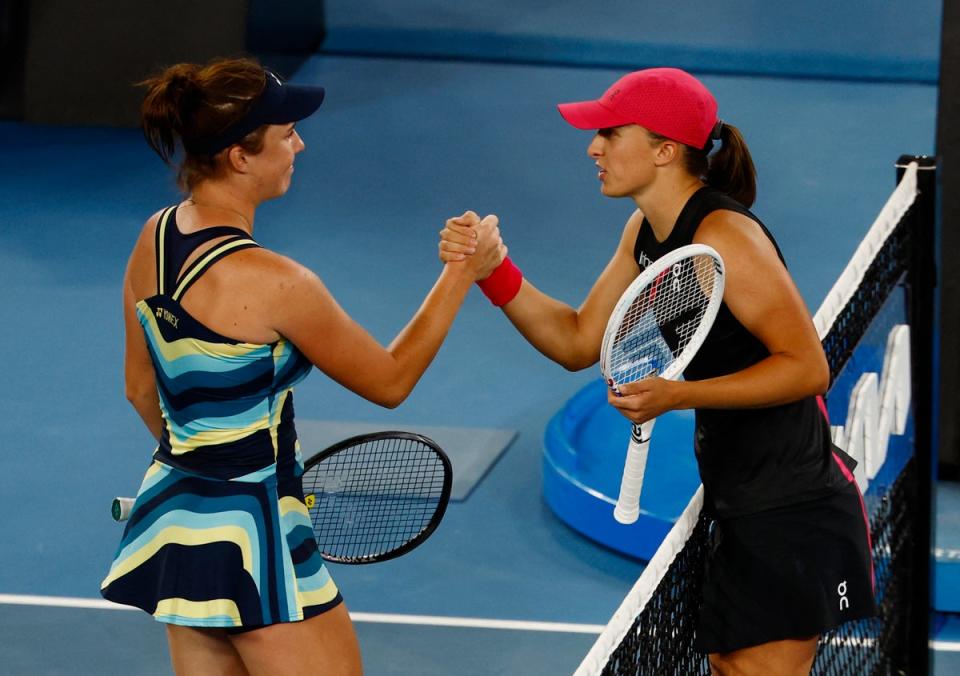
She is the first teenager to beat a world number one at the Australian Open since Amelie Mauresmo defeated Lindsay Davenport in 1999. Noskova next plays 19th seed Elina Svitolina, who was a comfortable 6-2 6-3 winner over Viktorija Golubic and will fancy her chances of reaching a first grand slam final.
So, too, will 12th seed Zheng Qinwen, who is the highest-ranked player left in the top half and is making waves, 10 years on from Li Na’s historic triumph.
In the last 16, Zheng will take on Oceane Dodin, who defeated fellow unseeded French player Clara Burel 6-2 6-4 to reach the fourth round at a slam for the first time.
One of Zheng, Dodin, 26th seed Jasmine Paolini and Russian Anna Kalinskaya is guaranteed to make a first slam semi-final.
Paolini ended the run of Anna Blinkova, who knocked out Elena Rybakina in round two, while Kalinskaya beat former finalist Sloane Stephens 6-7 (8) 6-1 6-4.
It is turning into an excellent tournament for Ukraine, with Dayana Yastremska joining Svitolina and Marta Kostyuk in the last 16, thanks to a 6-2 2-6 6-1 upset of 27th seed Emma Navarro.
She next faces two-time former champion Victoria Azarenka, who is again looking strong in Melbourne and came from 2-5 down in the second set to beat Jelena Ostapenko 6-1 7-5.
In the men’s draw, Carlos Alcaraz reached the fourth round of the Australian Open for the first time after opponent Shang Juncheng retired with injury in the third set. Alcaraz was forced to miss the tournament last year with a leg injury and he said: "I was watching the matches at home from the couch, wishing to play in the second week here. It feels special."
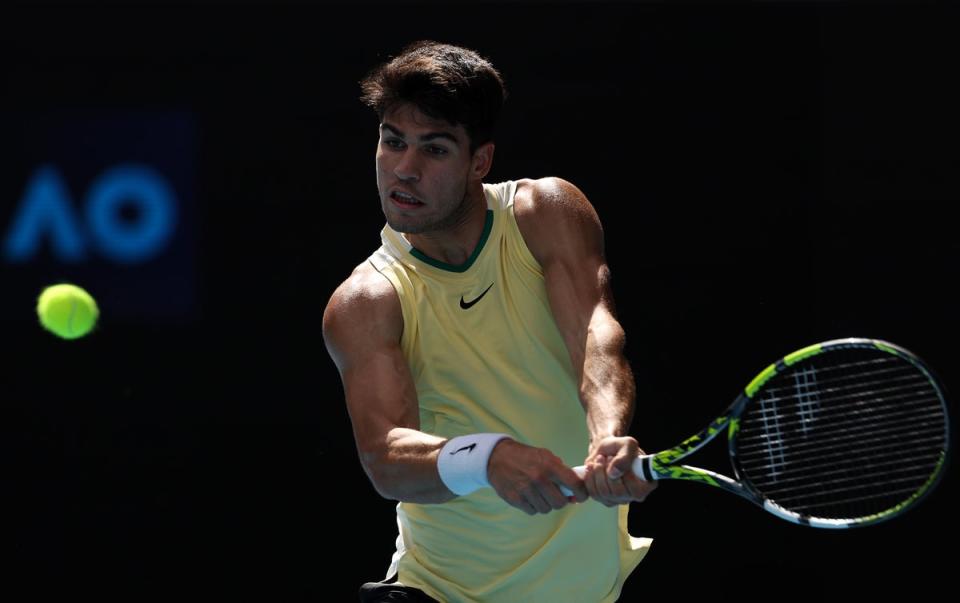
The young Spaniard will expect to go further than just the fourth round, where he will play Serbia’s Miomir Kecmanovic. The latter saved two match points for the second round in a row, defeating American Tommy Paul 6-4 3-6 2-6 7-6 (7) 6-0.
One of the biggest surprises of the week so far has been French wild card Arthur Cazaux, who brushed aside 28th seed Tallon Griekspoor 6-3 6-3 6-1 to make the last 16 on his debut.
He will next play ninth seed Hubert Hurkacz, who came from a set down to defeat another Frenchman, Ugo Humbert, 3-6 6-1 7-6 (4) 6-3.
The biggest upset of the day was delivered by Nuno Borges, who knocked out in-form 13th seed Grigor Dimitrov 6-7 (3) 6-4 6-2 7-6 (6) to become the first Portuguese player to make the fourth round in Melbourne.
In the last 16, he will take on third seed Daniil Medvedev, who bounced back from his 3.39am finish against Emil Ruusuvuori on Friday morning to defeat Felix Auger-Aliassime 6-3 6-4 6-3.
Sixth seed Alexander Zverev avoided a long night on Laver, seeing off American teenager Alex Michelsen 6-2 7-6 (4) 6-3 to set up a clash with Britain’s Cameron Norrie.

